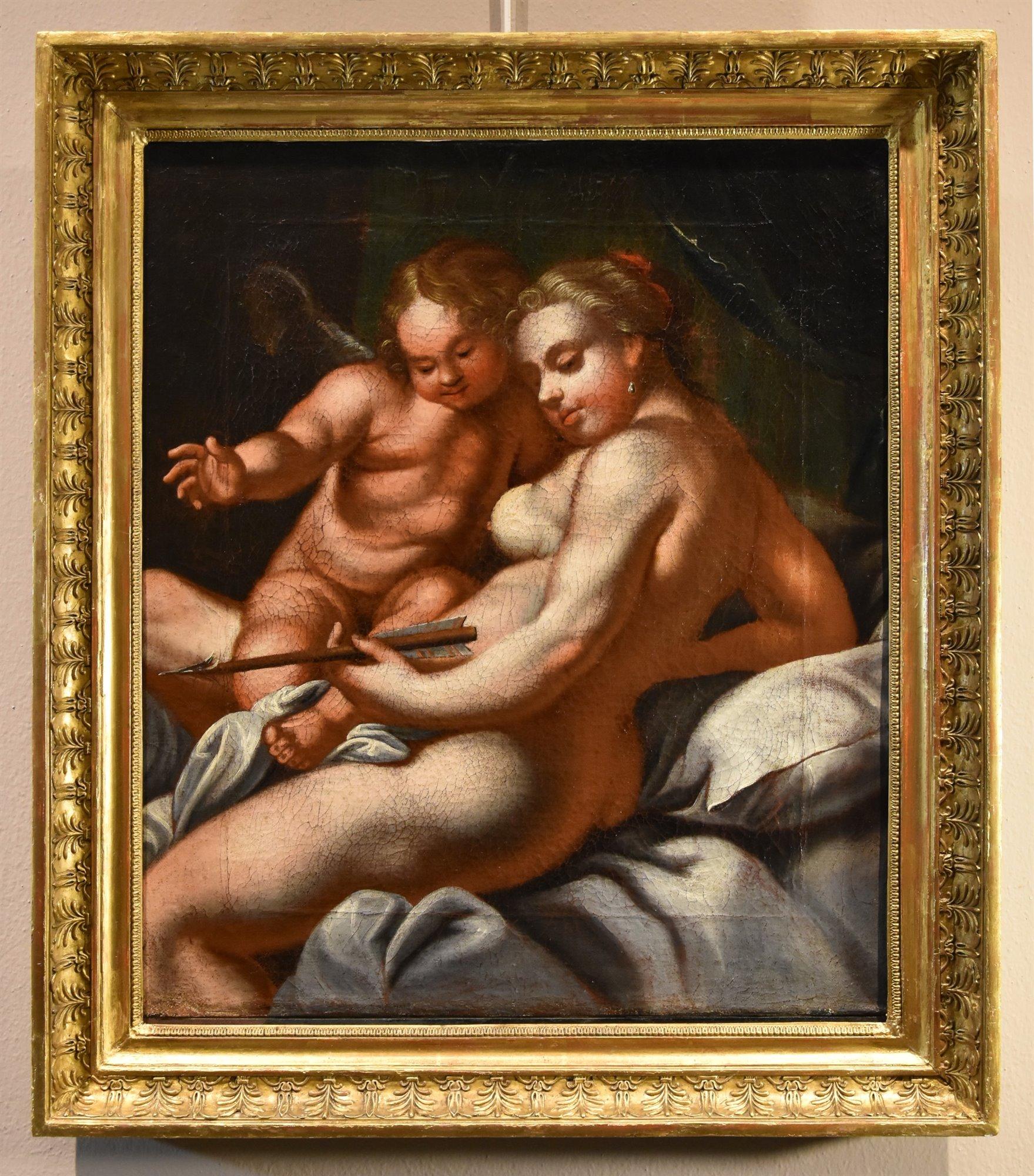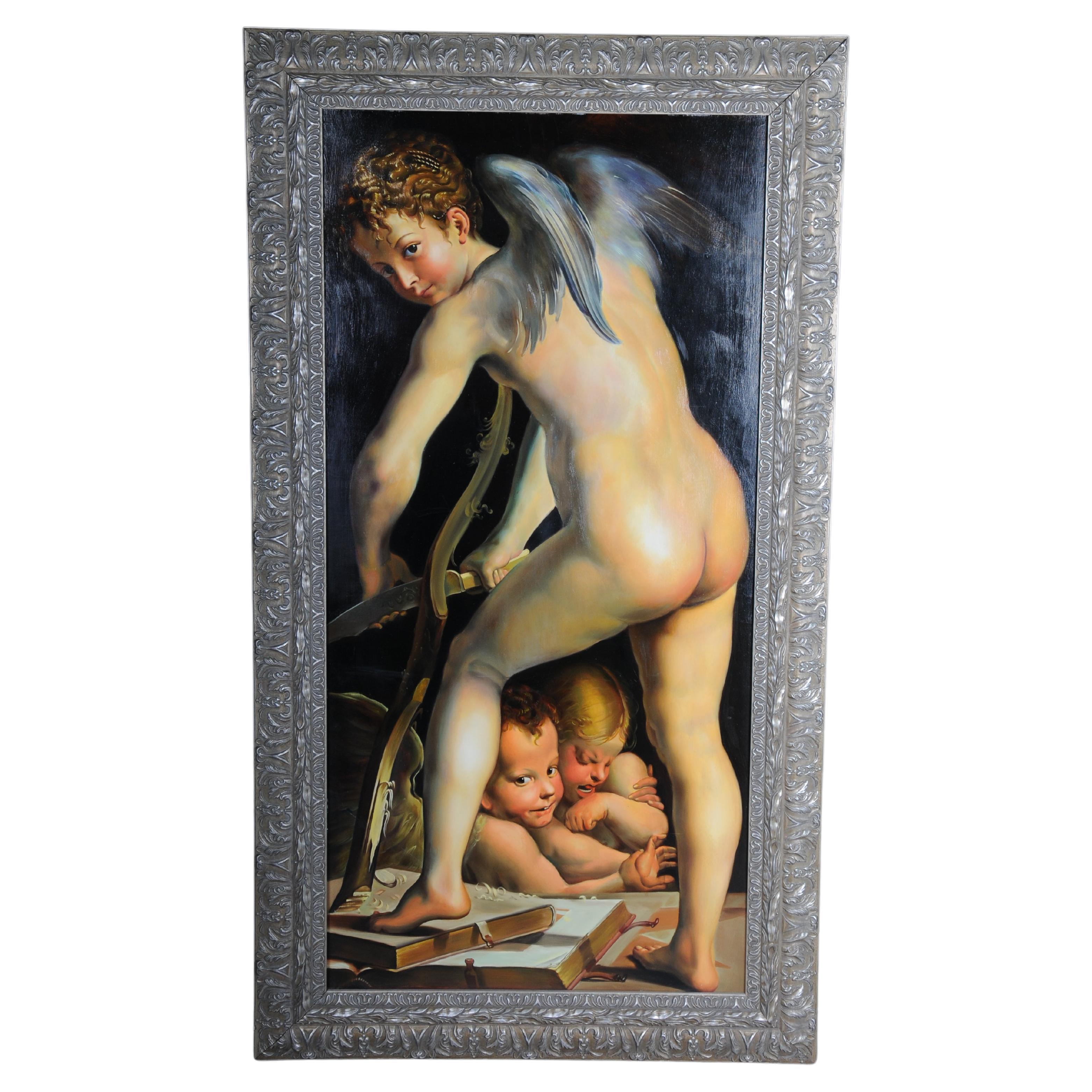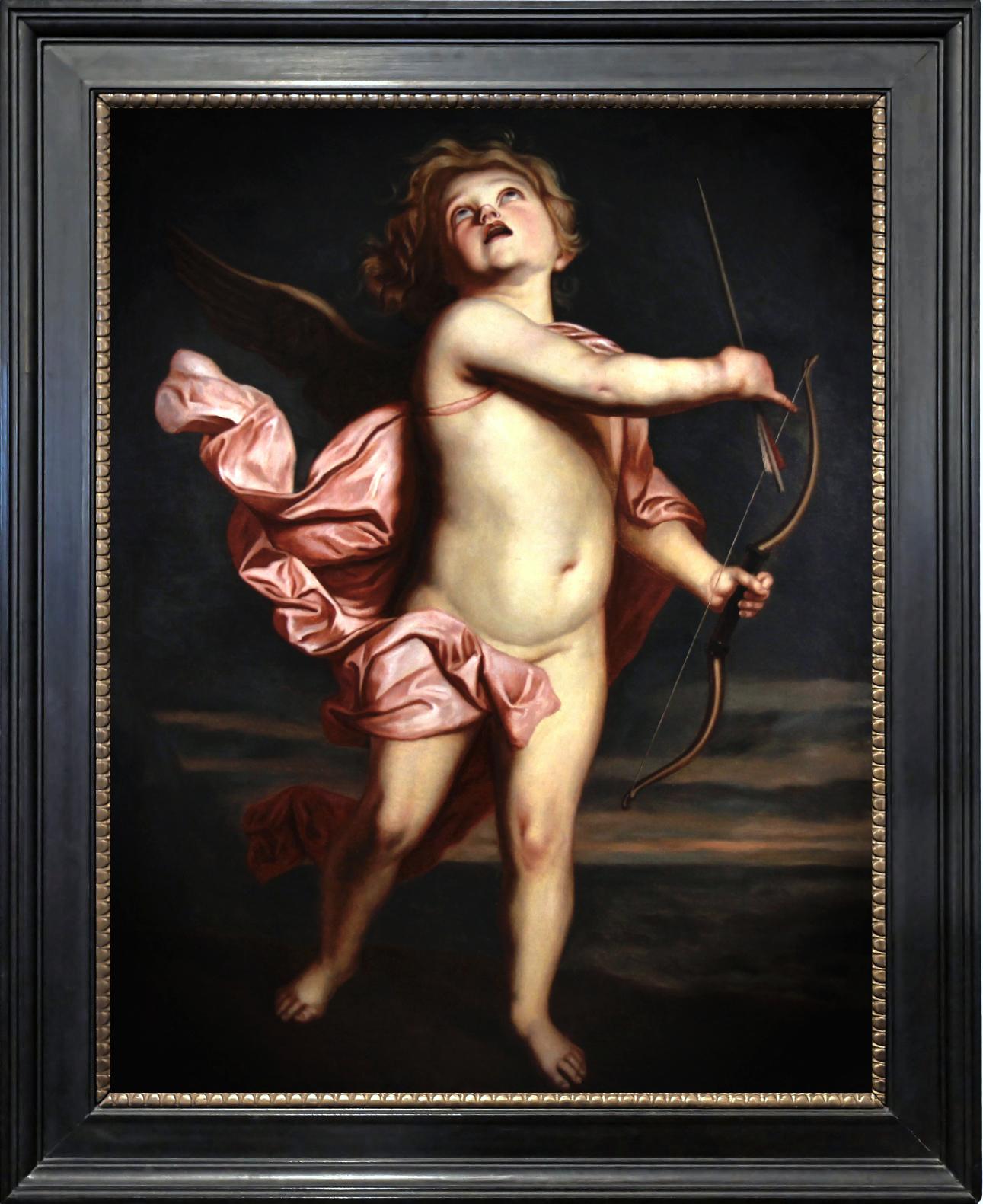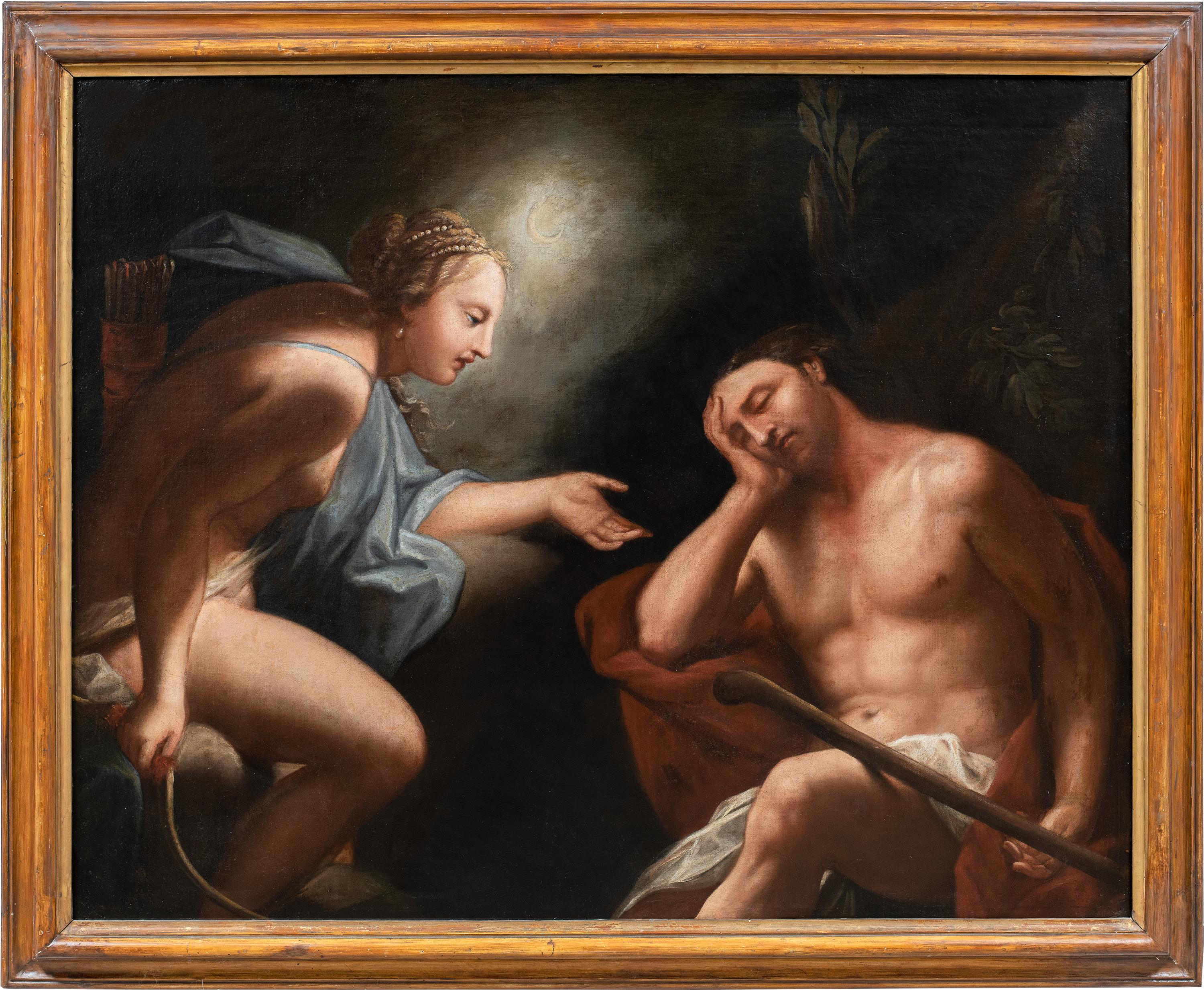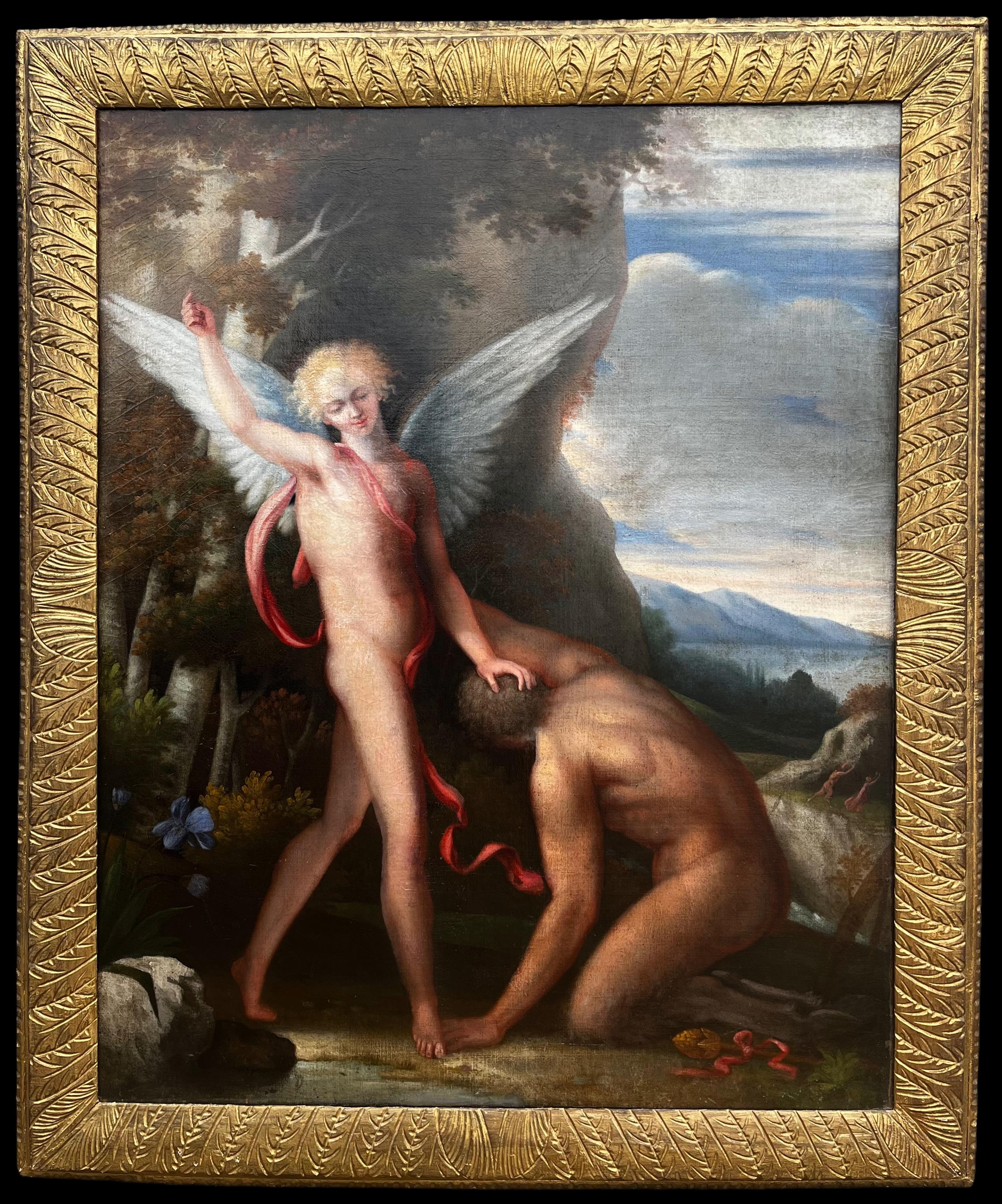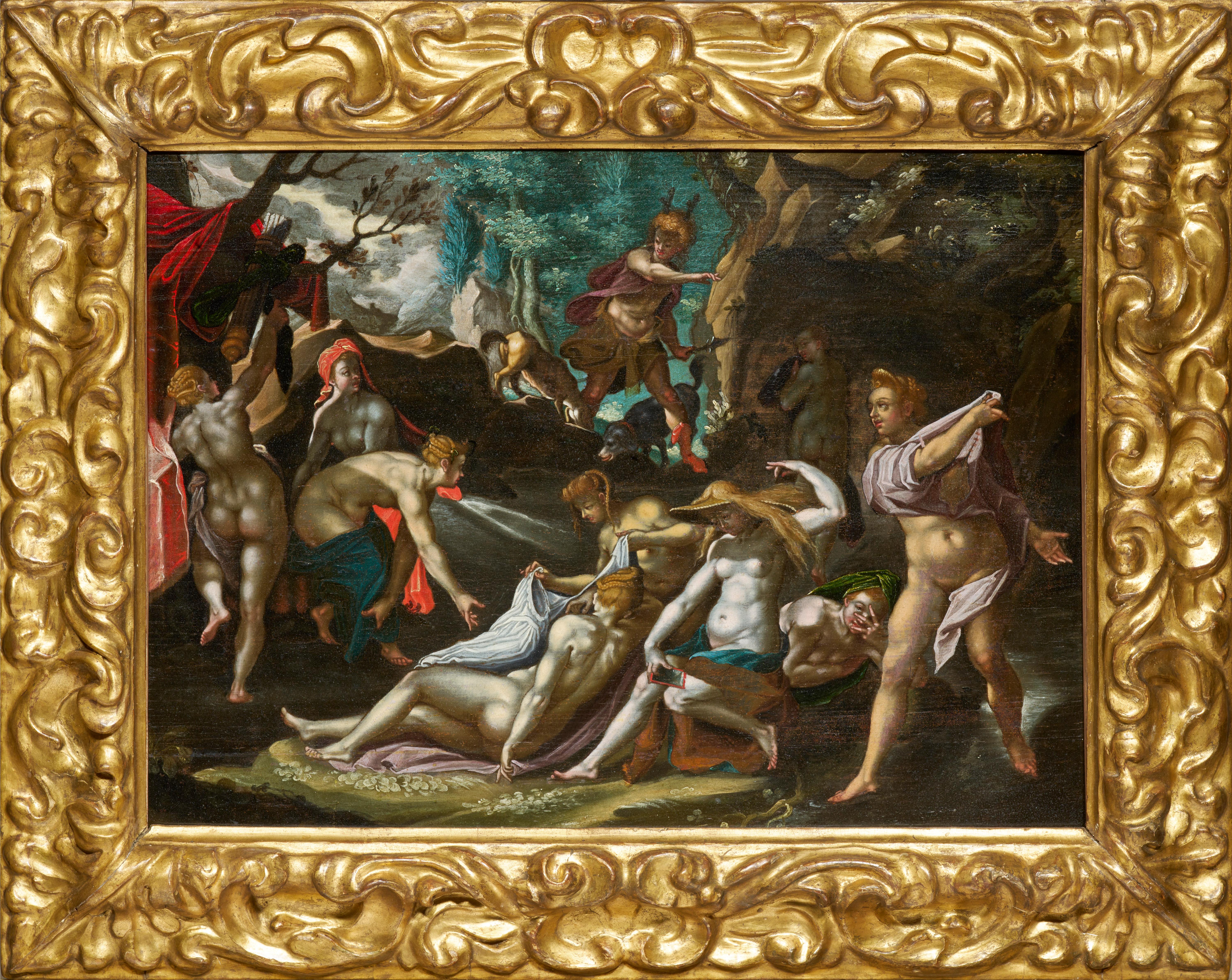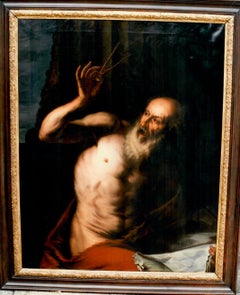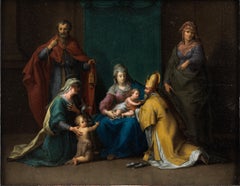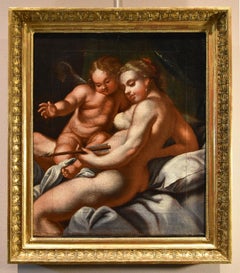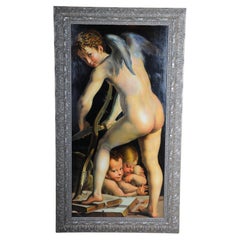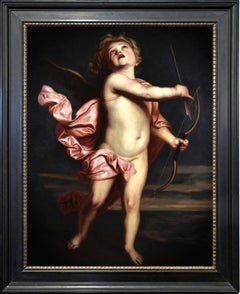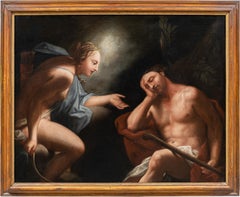Items Similar to Amor Cutting Bow, Parmigianino, Old Master, Mannerism, Prague, Large Painting
Video Loading
Want more images or videos?
Request additional images or videos from the seller
1 of 16
Amor Cutting Bow, Parmigianino, Old Master, Mannerism, Prague, Large Paintingc. 1610
c. 1610
$53,214.18
$177,380.6170% Off
£40,451.67
£134,838.8970% Off
€45,000
€150,00070% Off
CA$74,784.55
CA$249,281.8470% Off
A$81,317.55
A$271,058.5070% Off
CHF 42,846.41
CHF 142,821.3770% Off
MX$987,772.31
MX$3,292,574.3670% Off
NOK 538,665.89
NOK 1,795,552.9670% Off
SEK 504,955.77
SEK 1,683,185.8970% Off
DKK 344,439.44
DKK 1,148,131.4770% Off
About the Item
Already in the collection of Emperor Rudolf II in the first decade of the 17th century this composition was famous. The original is by Parmigianino and Rudolf's court painter Joseph Heintz the Elder made a copy after Parmigianino's Arch Carving Cupid, painted in 1535. These two paintings hung side by side for a long time in the imperial treasury in Vienna, where they were considered a special sight. Soon there were myths about the paintings, that Heintz had even died out of grief that his copy could never reach the artistry of the original.
The inspiration for this composition possibly goes back to a sculpture that Parmigianino might have seen in 1530 in the Grimani collection in Venice. In fact, Eros/Amor/Cupido stands before us like a painted sculpture. The subject probably goes back to late antique ideas in which Eros, Himeros (desire) and Pothos (longing) form an erotic triad. In the Renaissance it is redefined as heavenly and earthly love. This painting is thus a comment on the difficulty of choosing between these two forms of love.
The present painting is certainly connected to the composition by Heintz and it is another version of this subject by an so far unkown painter. The style clearly shows the influence of the Prague School. Its quality illustrates the style of Mannierism.
It is a very large, decorative piece and it creates a unique atmosphere in an interior.
Amor Cutting His Bow, 17th Century, Old Master, Mannierism, Rudolph II.
- Creation Year:c. 1610
- Dimensions:Height: 55.12 in (140 cm)Width: 34.26 in (87 cm)
- Medium:
- Movement & Style:
- Circle Of:Joseph Heintz (1564 - 1609, Swiss)
- Period:
- Condition:
- Gallery Location:Greven, DE
- Reference Number:1stDibs: LU155027942902
About the Seller
4.8
Vetted Professional Seller
Every seller passes strict standards for authenticity and reliability
Established in 2011
1stDibs seller since 2021
30 sales on 1stDibs
Typical response time: 6 hours
- ShippingRetrieving quote...Shipping from: Greven, Germany
- Return Policy
Authenticity Guarantee
In the unlikely event there’s an issue with an item’s authenticity, contact us within 1 year for a full refund. DetailsMoney-Back Guarantee
If your item is not as described, is damaged in transit, or does not arrive, contact us within 7 days for a full refund. Details24-Hour Cancellation
You have a 24-hour grace period in which to reconsider your purchase, with no questions asked.Vetted Professional Sellers
Our world-class sellers must adhere to strict standards for service and quality, maintaining the integrity of our listings.Price-Match Guarantee
If you find that a seller listed the same item for a lower price elsewhere, we’ll match it.Trusted Global Delivery
Our best-in-class carrier network provides specialized shipping options worldwide, including custom delivery.More From This Seller
View AllHercules and Omphale, Old Master Painting, Mannerism, Baroque, Mythology, Prague
Located in Greven, DE
Hercules and Omphale
Oil on panel, 52 x 41 cm
According to legend, Hercules had to make atonement and became a slave to the Lydian queen Omphale. When she found out who her slave was, she married him. Falling for his mistress and made effeminate by the luxury of court life, the former hero allowed himself to become the laughing stock of the court. He dressed in women's clothes, spun wool and did other women's work, whereas Omphale wore his lion's skin and carried a wooden club. When the time of punishment was over, the hero realised his delusion and left Omphale.
So far, the painting could not be clearly assigned to an artist. Nevertheless, it impresses with its fluid and convincing painting, whose colourfulness and conception are reminiscent of the Prague School around Bartholomäus Spranger.
This work follows an engraving and an etching made by Michel Dorigny in 1643 after a design by Simon Vouet. It shows the same scene but the print differs in minor details from the present painting (see e.g. the head of the lion) and the treatment of the faces seems to be painted more detailed and refined.
So far there is no painting...
Category
17th Century Baroque Figurative Paintings
Materials
Oil, Panel
Fenzoni, Painting AND preparatorial Drawing, John the Baptist, Italy Renaissance
By Ferrau Fenzoni
Located in Greven, DE
The painting and the preparatory drawing are offered together.
Provenance
Private collection, Germany, Trier, c. 1980- 2013
Saint John the Baptist
Brown ink and wash over red chalk on oatmeal paper
31 x 20.5 cm
Inscribed: „Ferrau Fenzonio da Faenza invt. esque … imp. da Fran. Villamena …“.
bears the collector's mark of Henry Scipio Reitlinger (1882-1950; Lugt 2274a) on a tiny label glued to the verso
On the reverse is a partial drawing of a Pieta, pricked for transfer.
Provenance
New York, Doyle, 14. October 2015, No. 6
The painting and the preparatory drawing resemble the composition of an engraving after Ferraù Fenzoni by Francesco Villamena. Drawing, engraving and painting are almost identical, except for minor differences. Even the measurements nearly correspond: painting (32 x 25,5 cm), drawing (30 x 20,5 cm), engraving (31,1 x 23,5 cm).
Dr. Guiseppe Scavizzi confirmed the attribution of the present panting to Fenzoni and he dates it to c. 1590.
The inscription on the drawing reads “Ferrau Fenzonio da Faenza invt. esque. . . imp. da Fran: Villamena . . .”. The engraving’s inscription also lists place and date “Ferra Fensionius inventor/F. Villamoena sculpsit Rome/Aspectu fruitur… antra puer/cum Privilegio… 1613”.
Interestingly, the engraving is not mirrored as it is in most printing processes. Painting, drawing and engraving are not reversed but the same. It is remarkable to note that there are further paintings by Fenzoni which were engraved in the same order and not reverted. They also show strong parallels regarding the compositions and the measurements (see for example “Deposition of Christ” ).
Ferraù Fenzoni was an Italian painter mainly active in Todi. He is also called Il Faenzone after his birthplace (Faenza). He apprenticed in Rome during the papacy of Gregory XIII and contributed to numerous fresco cycles under pope Sixtus V, such as the Loggia della Benedizioni in the Lateran Palace, the frescoes on the walls and vaults of the Scala Santa of the adjacent Basilica of San Giovanni in Laterano, and the decoration in the Sistine library. His expressive canvases straddle the styles of Mannerism and Baroque. In 1594, he moved to Todi. A “Last Judgement” by him is housed in the cathedral of Todi. He returned to Faenza in 1599, where he decorated chapels in the cathedral from 1612 to 1616. In 1622, he completed a “Deposition”, now in the local Pinacoteca. In 1640, Fenzoni was named “cavaliere dello speron d’oro” by Cardinal Colonna and, on 25th April 1634, he was nominated vicar and “castellano of Granarolo”.
Fenzoni‘s style is characterized by a mixture of the Mannerism of the Northern Netherlands and the Italian Baroque.
Saint John the Baptist, Old Master, 17th Century, By Fenzoni, Religious Scene, Rome Art...
Category
16th Century Mannerist Figurative Paintings
Materials
Canvas, Oil, Handmade Paper
Ferrau FenzoniFenzoni, Painting AND preparatorial Drawing, John the Baptist, Italy Renaissance, 1590
$28,380 Sale Price
25% Off
Euklid Philosopher, Portrait of a Man, Old Master Painting, Baroque Art
Located in Greven, DE
Impressive Painting of the philosophy Euclid, painted in the Manner of Luca Giordano.
Provenance: Amsterdam, Sotheby's, 21.11.1995, Lot 46
Category
17th Century Baroque Figurative Paintings
Materials
Canvas, Oil
Sacra Conversazione, Maria, Christ, Old Master, Religious, Baroque Painting, art
Located in Greven, DE
Attributed to Peter Candid / Pieter de Witte
(Bruges c. 1540 - 1628 Munich)
Sacra Conversazione
Oil on wood, 29 x 37 cm
The painter, sculptor and architect Peter Candid, known in Italy as Pietro Candido, was born in Bruges between 1540 and 1548. In the 1560s he stayed in Florence, where he worked in the workshop of Giorgio Vasari, with whom he collaborated on a number of commissions for the House of Medici. After a brief stay in Volterra, he went to Munich in 1586. For the next 42 years, until his death, he remained court painter to Duke William V...
Category
17th Century Renaissance Figurative Paintings
Materials
Oil, Panel
Baroque Italian Old Master, Madonna, Child, Angels, Oval, Marratta, Christmas
By Workshop Of Carlo Maratta
Located in Greven, DE
Religious Painting, depicting Madonna and the Child, surrounded by Angels by the Circle of Carlo Maratta (Maratti). This painting is wonderful example of...
Category
18th Century Baroque Figurative Paintings
Materials
Canvas, Oil
$18,920 Sale Price
20% Off
Old Master Drawing, Baroque, Jacob de Wit, Allegory of Victory, Putti, Ships
By Jacob De Wit
Located in Greven, DE
Two putti with symbols of war and victory (cannons, cannonballs, armour, anchor, lion's head, laurel branch/ olive branch, flag, staff with helmet) in pediment triangle.
Probably a design for a painting or architecture
Pen-and-ink drawing in black on brownish paper, black wash
Plain gold moulding with UV glass
Allegory of Victory, 18th Century, Old Master Drawing, By De Wit, Figurative
Jacob de Wit...
Category
Late 17th Century Baroque Figurative Drawings and Watercolors
Materials
Paper, Crayon
$2,152 Sale Price
35% Off
You May Also Like
Venus Cupid 17/18th Century Paint Oil on canvas Old master Venetian school
Located in Riva del Garda, IT
Venetian painter of the 17th/18th century
Venus and Cupid
Oil on canvas 57 x 49 cm. In frame 71 x 61 cm.
The painting captures the attention with its intimate and sensual re...
Category
17th Century Old Masters Paintings
Materials
Oil
$5,534 Sale Price
20% Off
Monumental oil painting F. Mazzola, called Parmigianino - Bow-carving Amor, rare
Located in Berlin, DE
Monumental oil painting Francesco Mazzola, called Parmigianino - Bow-carving Amor
Masterful monumental painting, oil canvas on solid basswood....
Category
20th Century Italian Paintings
Materials
Canvas, Wood
$8,031 Sale Price
20% Off
Old baroque oil painting on canvas "Cupid" after Sir Anthony van Dyck
By Anthony van Dyck
Located in Gavere, BE
Oil on canvas "Cupid" circa 1900 after Anthony van Dyck ** Sold without the frame **
additional info:
Title: cupid
Style: baroque
Medium: oil on canvas
Signature: unsigned
Provenan...
Category
1890s Baroque Figurative Paintings
Materials
Canvas, Oil
Antonio Bellucci (Venetian master) - Early 18th century figure painting - Diana
Located in Varmo, IT
Antonio Bellucci (Venice 1654 - Soligo 1726) - Diana and Endymion.
122 x 152 cm unframed, 142 x 172 cm framed.
Oil on canvas, in a carved and lacque...
Category
Early 18th Century Baroque Figurative Paintings
Materials
Canvas, Oil
Huge 1700's Florentine Old Master Oil Painting Eros Triumph over Pan Male Nudes
Located in Cirencester, Gloucestershire
The Triumph of Eros over Pan
Florentine School, early 1700's period, unsigned
oil on canvas, framed
framed: 58 x 48.5 inches
canvas: 50 x 40 inches
Provenance: private collection, Pa...
Category
Early 18th Century Old Masters Nude Paintings
Materials
Oil
Diana and Actaeon, a Mannerist painting after Joseph Heintz the Elder
Located in PARIS, FR
This painting seduced us with its rich colors. Depicting Diana and her companions surprised by Actaeon, it was inspired by an engraving by Aegidius Sadeler II after a painting by Jos...
Category
17th Century Old Masters Nude Paintings
Materials
Oil, Wood Panel
